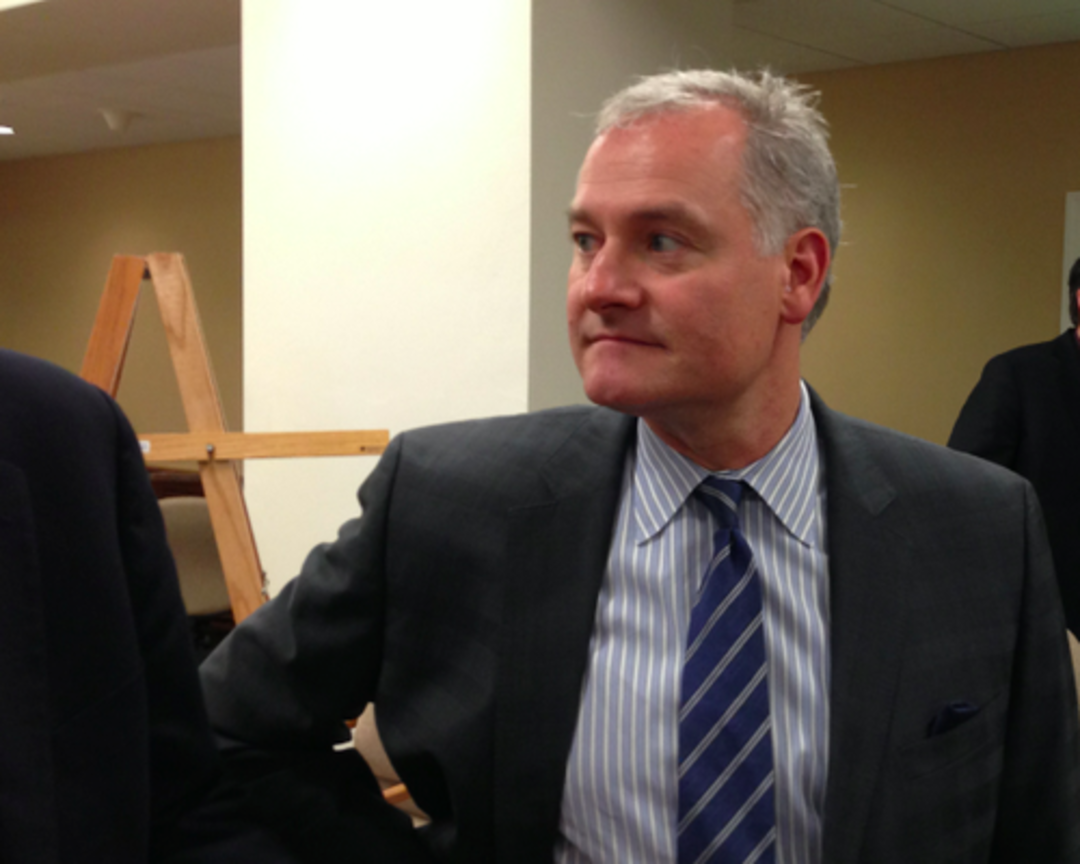Democrats Make Budget Offer, Drop Call for B&O Tax Extension
"At some point we had to make a move," state house finance chair Rep. Reuven Carlyle (D-36, Queen Anne) said today, explaining the compromise budget offer the state Democrats made to the Republican-controlled senate. Carlyle concluded: "Because that's how you govern. I hope there's a deal now. We'll see if they continue to be intransigent, but this is what you do to create movement."

Rep. Reuven Carlyle
With six days left in the special session, and with Gov. Jay Inslee letting both sides now he was getting impatient, the Democratic budget leaders—recognizing that the Republicans were not going to budge on their opposition to taxes—dropped their longstanding proposal to raise about $550 million through a business and occupation tax surcharge on professional services. They also scaled back a proposal to close 15 tax loopholes worth $500 million—proposing to close just seven instead, for a savings of about $255.6 million. (They'd already backed off on their initial $60 million beer tax proposal.)
The drop in revenue assumptions forced the Democrats to scale back their spending proposal by about $790 million; education spending took the biggest hit. The $700 million in new K-12 education spending they proposed today, for example, only represents “half of what we felt we needed to comply with the McCleary decision,” house majority leader Rep. Pat Sullivan (D-47, Covington) said, referring to the Washington State Supreme Court's McCleary decision, which mandated the state meet its constitutional "paramount duty" to fund education and increase K-12 education funding, which translated to about $1.4 billion in additional dollars. Originally, the Democrats proposed adding $1.3 billion to K-12 education.
In addition to scaling back their initial K-12 funding, the Democrats new offer scales back child care and early learning services and reduces capital budget spending.
"We've given up hope on a bold investment in [K-12 education]... because, hey, we can count votes, message received, [the Republicans] won't vote for it."—Rep. Reuven Carlyle"This budget is a down payment – not as much as we'd like, or we passed out of the house – but it does allow us to move forward in reducing class size, investing in all-day kindergarten, and supporting college students,” house appropriations chair and Democratic budget lead Rep. Ross Hunter (D-48, Medina) said in a prepared statement.
Carlyle was more direct. In an interview after the press conference, he told us: "We’ve given up hope for a bold investment in McCleary because they [the senate Republicans] don’t want to vote for it," Carlyle told PubliCola when we asked if he thinks the Supreme Court will consider the current proposal good enough. "We've given up on closing more tax loopholes and investing in K-12 education because, hey, we can count votes, message received, they won't vote for it."
The Democrats' budget proposal actually does go after seven of the tax breaks they've been targeting all session.
• Preferential B&O Rate: Travel Agents & Tour Operators, $11.7 million• Repeal Preferential B&O Rate: Resellers of Prescription Drugs, $27.8 million
• Repeal Exemption: Sales Tax on Bottled Water, $49.3 million
• Narrow Exemption: Sales Tax for Non-Residents, $47.3 million
• Repeal Exemption: Extracted Fuel, $40.8 million
• Narrow: High Technology Research & Development B&O Credit, $23.2 million
• Repeal Exemption: High Technology Research & Development Sales & Use Tax Exemption, $55.5 million
The revenue from closing these tax exemptions will be dedicated to what the Democrats are calling the "Education Investment Act." At the press conference, Carlyle said the money will go to "wrap-around services, parent engagement coordinators, dropout prevention, guidance counselors, and bilingual education." Additionally, the act increases state funding of full-day kindergarten from 22 percent to 53 percent.
Meanwhile, the Democrats are trying to close a tax loophole in the voter-approved estate tax which inadvertently let couples off the hook. They're also proposing the closure of a tax loophole on traditional land-line phone service.
The governor's office released a statement supporting the Democrats' budget. "The proposed Education Investment Act would go even further [to fund education] and I hope it, too, will be considered." Inslee urged the Democrats and Republicans to finish the budget on time, and praised the Democrats' budget as a "solid and much-needed step forward in our negotiations."
Whether or not the Senate would work with the Democrats' proposal, Sen. Jim Hargrove (D-24, Hoquiam) replied "you'll have to get a response from them."
Republican-dominated senate Majority Coalition Caucus leader Rodney Tom said in a statement, "I am disappointed that this House budget proposal is balanced on the backs of Washington’s school kids. Our children deserve our first dollars, not our last dime. We in the Senate will continue to work with our House colleagues to seek a workable compromise, but we will not let political expediency stand in the way of fulfilling our obligation to provide for our schools."
Meanwhile, house Republican budget leader Rep. Gary Alexander (R-20, Olympia) said the proposal found some "common ground," though he wondered if it had the full support of the Democratic caucus. He also criticized the Democrats for negotiating through the press. (Carlyle said the ticking clock made it necessary to get a proposal out there.) Alexander concluded: “In the end ... while this proposal has the possibility of bringing both chambers closer together, the process they used may very well drive us apart.”
Sen. Sharon Nelson (D-34, Seattle), the other Democrat lead budget negotiator on the senate side, said the Democrats' new budget "does reflect a significant compromise. House Democrats need to be recognized for how far they’ve moved from their original position to move the process forward and get the job done. This budget, and our children's future, relies on that action. We have six days left in the special session, and I hope we’ll be able to pass this budget and move this forward."




